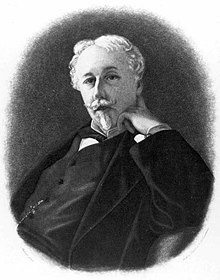Arthur de Gobineau
| Arthur de Gobineau | |
|---|---|

Portrait of Gobineau, by the Comtesse de la Tour, 1876
|
|
| Born |
14 July 1816 Ville-d'Avray, Hauts-de-Seine |
| Died | 13 October 1882 (aged 66) Turin |
| Nationality | French |
Joseph Arthur, Comte de Gobineau (14 July 1816 – 13 October 1882) was a French who was best known by his contemporaries as a novelist, diplomat and travel writer but is today most remembered for developing the theory of the Aryan master race and helping to legitimise racism by scientific racist theory and racial demography. Gobineau was an elitist who, in the immediate aftermath of the Revolutions of 1848, wrote a 1400-page book, An Essay on the Inequality of the Human Races, in which he claimed that were superior to commoners and that they possessed more Aryan genetic traits because of less inbreeding with inferior races (Alpines and Mediterraneans).
Gobineau's writings were quickly praised by white supremacist, pro-slavery Americans like Josiah C. Nott and Henry Hotze, who translated his book into English but omitted around 1000 pages of the original book, including those parts that negatively described Americans as a racially mixed population. Gobineau's writings were also influential on prominent anti-Semites such as Richard Wagner, the Romanian far-right politician professor A. C. Cuza and leaders of the Nazi Party, who later edited and re-published his work.
Gobineau came from an old well-established aristocratic family. His father, Louis (1784-1858), was military officer and staunch royalist, and his mother, Anne-Louise Magdeleine de Gercy, was the daughter of a non-noble royal tax official. The de Gercy family had lived in the French Crown colony of Saint-Domingue (modern Haiti) for a time in the 18th century, and Gobineau was always obsessed with the fear he might had black ancestry on his mother's side. Reflecting his hatred of the French Revolution, Gobineau later wrote: "My birthday is July 14th, the date on which the Bastille was captured-which goes to prove how opposites may come together". As a boy and young man, Gobineau loved the Middle Ages, which he saw as a golden age of chivalry and knighthood that was much preferable to his own time. One who knew Gobineau as a teenager described him as a romantic, "already an Amadis with chivalrous ideas and a heroic spirit, dreaming of what most noble and most grand". Gobineau's father was very committed to restoring the House of Bourbon and helped the Polignac brothers escape from France. As punishment, Louis de Gobineau was imprisoned by Napoleon's secret police and was freed when the Allies took Paris in 1814. In the Hundred Days, the de Gobineau family fled France and after Napoleon's final overthrow following the Battle of Waterloo, Louis de Gobineau was rewarded for his loyalty to the House of Bourbon by being made a captain in the Royal Guard of King Louis XVIII. Despite expectations, the pay for a Royal Guardsman was very low, and the de Gobineau family struggled on his salary. Madeline de Gobineau abandoned her husband for her children's tutor Charles de La Coindière and together with her lover took her son and two daughters on extended wanderings across eastern France, Switzerland and the Grand Duchy of Baden. To support herself, Madeline de Gobineau turned to fraud (for which she was imprisoned), making her into a severe embarrassment to her son, who never spoke to her after he turned twenty. For the young Gobineau, committed to upholding traditional aristocratic and Catholic values, the disintegration of his parents' marriage, his mother's open relationship with her lover Coindière together with her turn to fraud, and the turmoil imposed by constantly being on the run and living in poverty were all very traumatic.
...
Wikipedia
